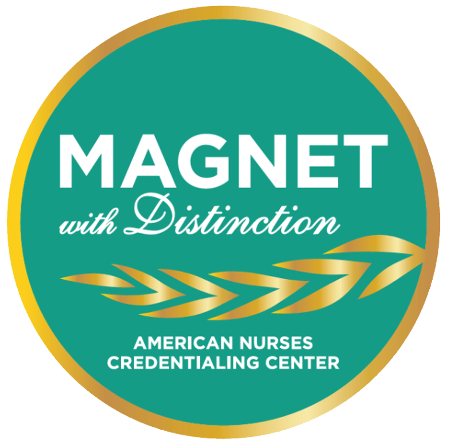For Immediate Release
Monday, Nov. 25, 2024
Contact:
Yvonne Hylton yvonne.hylton@nih.gov
The National Institutes of Health Clinical Center Achieves Prestigious Magnet® Recognition

The National Institutes of Health Clinical Center is proud to announce it has been designated as a Magnet with Distinction hospital by the American Nurses Credentialing Center’s Magnet Recognition Program. The Magnet status honors nursing professionalism, teamwork and superiority in patient care. Achieving this recognition is considered the highest national honor for nursing excellence.
With this credential, the NIH Clinical Center joins the elite community of Magnet-recognized organizations. Currently, only about 10 percent US hospitals achieve Magnet recognition, and less than one percent of those hospitals earn the Magnet with Distinction designation.
“We are honored to receive Magnet recognition with Distinction,” said Dr. Barbara Jordan, chief nurse officer. “Achieving Magnet status is a testament to the dedication of our NIH Clinical Center staff and Institute partners and reinforces the culture of excellence that is a cornerstone of how we serve our patients.”
To receive Magnet recognition, the NIH Clinical Center had to pass a rigorous multi-year process that demanded widespread participation from the hospital’s leadership and staff. This process included an electronic application, 3,000 pages of documentation addressing nearly 100 standards around patient care, a three-day on-site visit by Magnet appraisers and a comprehensive review by the full Commission on Magnet Recognition.
Those designated as Magnet hospitals have resulted in higher job satisfaction for nurses and higher ratings for patient satisfaction. Research shows that Magnet hospitals have a direct effect on the quality of patient care, evident in decreased mortality rates and shorter hospital stays.
###
About the NIH Clinical Center: The NIH Clinical Center is the world's largest hospital entirely devoted to clinical research. It is a national resource that makes it possible to rapidly translate scientific observations and laboratory discoveries into new approaches for diagnosing, treating, and preventing disease. Greater than 1,600 clinical research studies are conducted at the NIH Clinical Center, including those focused on cancer, infectious diseases, blood disorders, heart disease, lung disease, alcoholism and drug abuse. For more information about the Clinical Center, visit www.cc.nih.gov.
About the National Institutes of Health (NIH): NIH, the nation's medical research agency, includes 27 Institutes and Centers and is a component of the U.S. Department of Health and Human Services. NIH is the primary federal agency conducting and supporting basic, clinical, and translational medical research, and is investigating the causes, treatments, and cures for both common and rare diseases. For more information about NIH and its programs, visit www.nih.gov.

